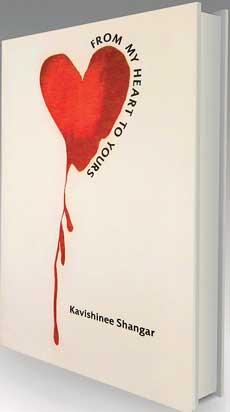06 Jul 2024 - {{hitsCtrl.values.hits}}
One paradox can be summarized as,‘We may not talk much...You’ll always be there’, she brings to light the complexities of friendship while highlighting its inexplicable beauty
 ‘My Heart to Yours’ is a book of poetry which is the personification of a teenage girl’s mind bleeding onto paper. Kavishanee Shangar aims to convey a message and tell a story. This book is a collection of poems written in the voice of a teenage girl living in a country that has yet to outgrow prejudice.
‘My Heart to Yours’ is a book of poetry which is the personification of a teenage girl’s mind bleeding onto paper. Kavishanee Shangar aims to convey a message and tell a story. This book is a collection of poems written in the voice of a teenage girl living in a country that has yet to outgrow prejudice.
Each poem is written in the form of a letter. The recipient is not named; rather, she invites all those who feel the same way to read. For example, the very first poem is written to herself. ‘To the Old Me, I’m Sorry.’ Each emotion of either ‘loving, breaking, or healing’ is something we have all undergone. Hence, ‘the old me’ no longer remains solely the old Shanghar, but the old us. She gives us a window into our past while discussing our present and the future she hopes to see. Regret is an emotion that ties us all, and by beginning her story with her regrets and her lessons learned, she begins with hope for not just herself, but for all her readers.
|
A book of poems portrays image of a teenage girl’s mind |
Written in free verse, each poem is relatable and easy to understand. In poems like ‘To the Confused One’, whichever way you go, you will be okay. We begin to realize that it’s impossible to have all the answers to life. This conclusion is often difficult to swallow. Learning to accept ignorance and uncertainty in ourselves brings on a catharsis.
Shangar highlights the fluidity of life with implicit meanings and metaphors. The ups and downs, the emotional upheavals, the minor inconveniences, the small moments of joy, and the memories embalmed in incandescent light. Her words is relatable and simple without lacking technique or personal style.
Life is also paradoxical. Shangar takes us through on a journey of self-reflection, confusion, and slow acceptance, as she reveals her own understanding of what she calls life.
One of my favourite paradoxes can be summarized as‘We may not talk much...You’ll always be there.’She brings to light the complexities of friendship while highlighting its inexplicable beauty and timelessness. Shangar manages to twist the haunting beauty of mundane life, highlighting little pockets of memories we often forget to celebrate.
Shangar does not hide her origins; although her thinking patterns may be perceived as foreign, her Sri Lankan blood is clear. She discusses topics such as alcoholism, mental health in teens, and how female bodies are presented in the status quo. While these are commonly discussed topics, she centers them in a Sri Lankan context, interlacing tradition and culture in her poetry. This is exemplified in poems such as, ‘To the monsters in my motherland, I hope Karma gets you.’ She is aware despite her young age, and she is unafraid of having her voice heard. Shanghar has it in spades. ‘We become one voice, one person, one nation.’ Her words embody the youth, protesting, pleading, and grasping at a better future.
What makes her message so powerful is that her poetry is without extra exaggerations. She appeals to a wide audience and her simple technique makes it easy for context to seep from the background and onto center stage. ‘So, am I a mad woman tonight? Yes. Yes, I am.’Many shy away from linking themselves to negatively portrayed media, but the boldness she writes with adds another layer of credibility and veracity to her work.
She explores the perspectives of a mother, a daughter, a child, and a woman, all while showcasing their untold stories and messages. The prejudice of insanity toward women runs rampant in history, and in just a few words, she is able to shatter it. Everyone carries a strand of madness in them, and sometimes that chaos is blessed in its beauty. There are 69 poems in ‘From My Heart to Yours’.
Social issues are interwoven into daily life, making it all the more startling in its integrity. Each poem has its own core message of either healing, breaking, or loving. Poems like ‘To the one I tried to be, I hope everything heals completely.’are written in the form of a conversation with the reader. ‘Tonight I put you to sleep singing the only lullaby I’ve ever known.’  This further blurs the line between the poet and the audience, inviting us to look through her eyes while speaking our plight.
This further blurs the line between the poet and the audience, inviting us to look through her eyes while speaking our plight.
Shangar writes inviting the audience to share their own experiences. She not only advocates for her own healing, but also for others to learn to love and heal from being broken.
28 Dec 2024 45 minute ago
28 Dec 2024 2 hours ago
28 Dec 2024 2 hours ago
28 Dec 2024 3 hours ago